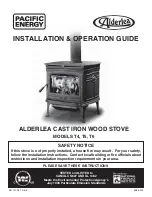
Page 22
Installation and Operation Manual - FW3200
ENGLISH
When the stove runs at a low combustion rate, light brown stains may form, especially in the
lower corners of the glass. This indicates that the fire has been smoky and some of the smoke
has condensed on the glass. It also indicates incomplete combustion of the wood, which also
means more smoke emissions and faster formation of creosote in the chimney.
The deposits that form on the glass are the best indication of the fuel quality and success in
properly using the stove. These stains can be cleaned with a special wood stove glass cleaner.
Do not use abrasive products to clean the glass.
The goal should be having a clear glass with no brown stains. If brown stains appear regularly
on the glass, something about the fuel or the operating procedure needs to be changed.
When brown streaks are coming from the edge of the glass, it is time to replace the gasket
around the glass. The glass gasket should be self-adhesive. Always replace the gasket with a
genuine one.
6.3.2 Replacement
The glass used is a ceramic glass, 5/32" (4 mm) thick, tested to reach temperatures up to
1400ºF. If the glass breaks, it must be replaced with one having the same specification.
To remove or replace the glass
(C)
:
1. Remove the door
(D)
from its hinges and lay it on a
soft, flat surface.
2. Remove the six screws
(A)
and both glass retainers
(B)
.
3. Remove the glass
(D)
. If it is damaged install a new
one in place. The replacement glass must have a
gasket all around.
4. Reinstall the glass, being careful to centre the glass
in the door and not to over-tightening the retaining
screw.
The two main causes of broken door glass are uneven placement in the door and over-
tightening the retaining screws.
Do not clean the glass when the stove is hot.
Do not abuse the glass door by striking or slamming shut.
Do not use the stove if the glass is broken.
D
C
A
B
















































